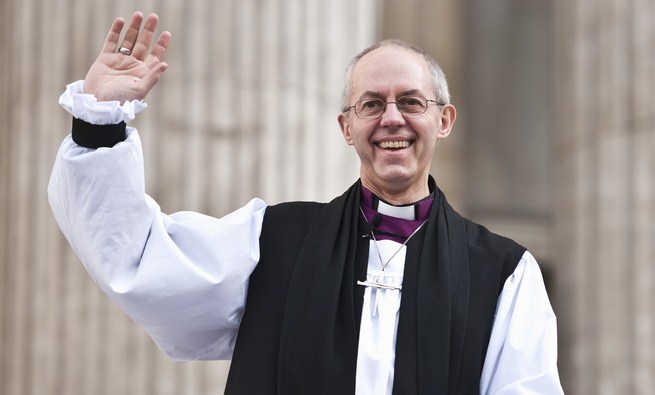20 September 2018
A Turbulent Priest?
Keep speaking, Welby.
By John Watson
 It is the greatest fun; a bit like a parlour game really. Work out where God would stand in a political dispute and claim Him as your supporter. The Crusaders did it. The Borgia popes did it. Now the controversy over Justin Welby’s TUC speech has brought the experts on the political views of the Almighty out in force. I think my favourite is:
It is the greatest fun; a bit like a parlour game really. Work out where God would stand in a political dispute and claim Him as your supporter. The Crusaders did it. The Borgia popes did it. Now the controversy over Justin Welby’s TUC speech has brought the experts on the political views of the Almighty out in force. I think my favourite is:
“He’s telling us that God is on the side of the Left. Thus forgetting that Jesus was in favour of justice as well as mercy.”
A Conservative Jesus on this occasion, I suspect; not to be confused with the marxist Jesus or the politically uninvolved one. John McDonnell entered into the party spirit with gusto by throwing doubts on the latter, asking rhetorically whether keeping out of politics was something which Jesus did. To judge by the wealth of expertise on divine views and behaviour you would think that these people spent all their time in church. Perhaps they do.
We at the Shaw sheet are cut from a more secular cloth and, having regrettably little insight into the thoughts of the Almighty, have to tackle the matter in a more prosaic manner. Still, we too are entitled to enjoy a little pomposity so let’s begin with the national interest. No, we can be grander than that. THE NATIONAL INTEREST! That is a bit more Daily Maily and important sounding, isn’t it?
So where are we politically as a nation? In a time of change, that is where. No, this isn’t about Brexit. The issue is broader than that. The social frameworks which worked well at the end of the twentieth century are failing to deliver the aspirations of the young and welfare of the poor. In part, that is because of the austerity flowing from the 2007 crash. In part it is because technology has changed the way in which wealth is created, leaving our social systems out of date. In part it is because systems devised in the 1980s have rather lazily been applied too widely. I expect you can think of a lot of other “in parts” too, but the truth of it is that we have to move on and the best brains from all parties and none should be worrying about how to spread benefits more widely without making people feel too threatened by the prospect of change.
So we need a national debate and the wider it is the better, people only being excluded from that debate where there is a reason for doing so. One can see why the Queen, who must be able to work with either party, needs to keep out of politics. The judges too. For justice to be seen to be done, they must be uniform and mechanical interpreters of the law. Police chiefs and others who have the duty of keeping a balance between different factions, probably fall into the same category. But the clergy? Why should their voices be still? Why on earth should we be deprived of their contribution? Actually, because they meet and talk to people of all backgrounds and classes, one would have thought that they had a useful contribution to make to the debate and that is particularly the case with the Archbishop of Canterbury, Justin Welby, whose experience is as wide and varied as his intelligence is obvious.
In addition to its experience, the Church has something else to contribute as well. The clergy fall a little outside the conventional political framework and should not suffer from the tribalism which infects party politics. At their best they can listen to everyone and carry ideas across political divides which are too deep for the rest of us to scale. They can talk to everyone and they should.
It is important here to bear in mind the difference between the Protestant and Catholic creeds. When the Pope speaks ex cathedra his word is the word of God. But the Archbishop of Canterbury’s words carry no such authority. He is a man of God, certainly, but his views are those of a man, sometimes fallible, sometimes inspired, sometimes wise, sometimes foolish. Sometimes he speaks on behalf of the Church of England and sometimes he does not. There is little that can be done to signal which capacity is which. Instead the matter has to be left to the common sense of the public who are well capable of making that sort of distinction.
Sometimes, of course, we all get confused about this but that is no more than the confusion we suffer when we listen to comments on politics generally. Is he talking as a TUC leader or a lay preacher? Are these her own views, or are they tailored to interests of the great corporation which she leads? The public can deal with that, and so they should be able to deal with political comments made by religious leaders.
If we are to have a public debate, the more people who speak freely the better, and we should hesitate to listen to those who try to stifle the views of others – whether that stifling takes place by no-platforming, by shouting them down or by trying to use their offices to keep them silent.


